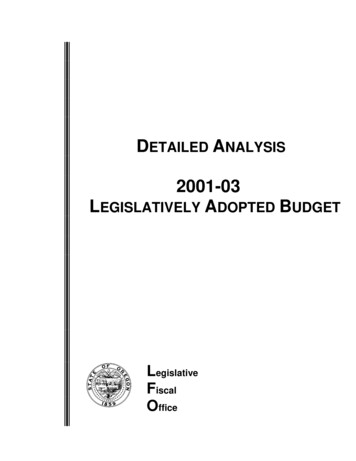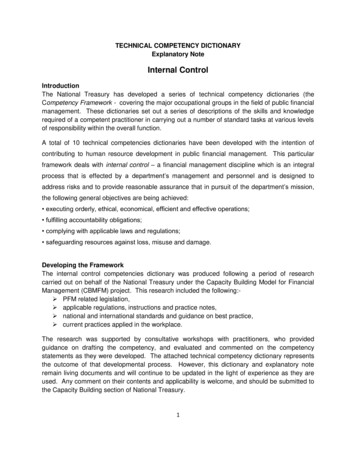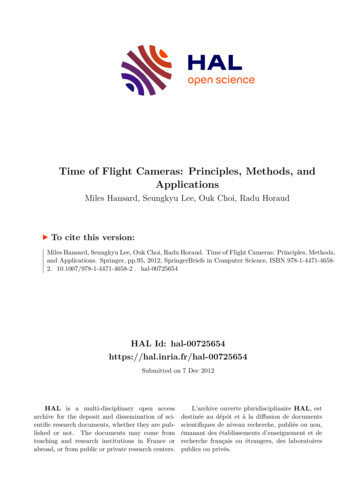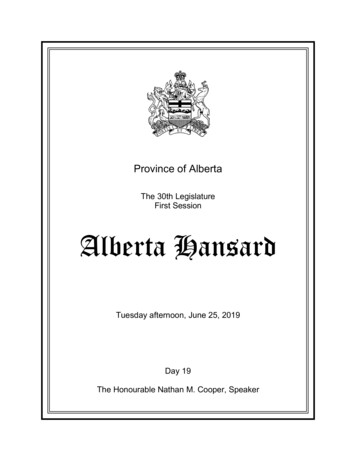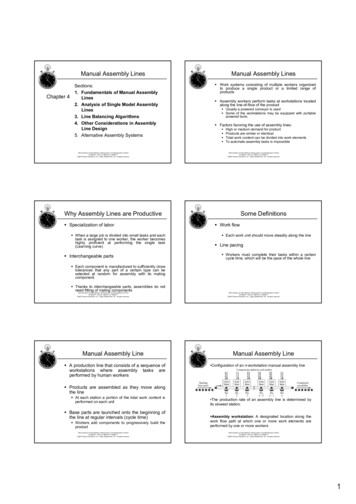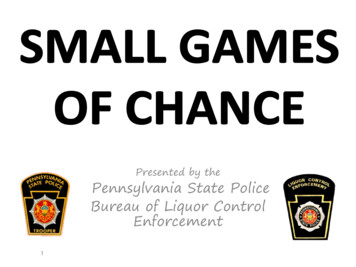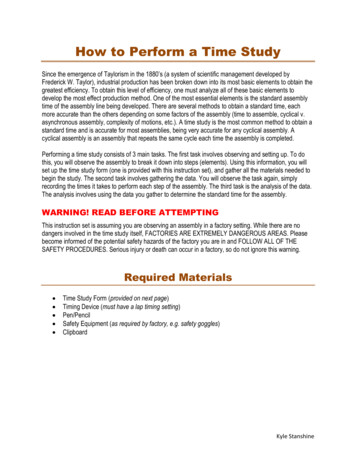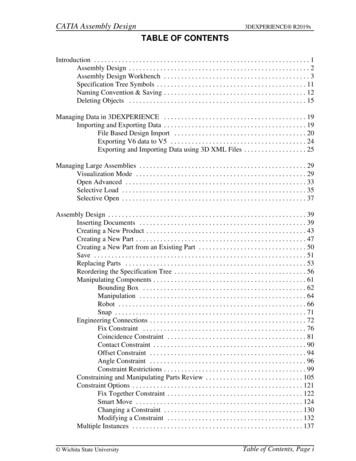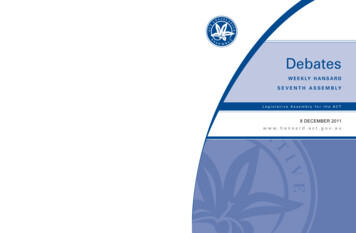
Transcription
19, 20, 21 AUGUST 2008Debatesw e e k ly h a n s a r ds e v e n t h a s s e M B lyLegislative Assembly for the ACTweekly hAnSArdpAGeS 3565 - 40392008108 DECEMBER 2011www.hansard.act.gov.au
Thursday, 8 December 2011Petitions: Drugs—petition No 127. 5903Distinguished visitors. 5903Food (Amendment) Bill 2011 . 5903Public Unleased Land Bill 2011 . 5907Government Procurement Amendment Bill 2011 . 5910Civil Unions Bill 2011 . 5911Crimes Legislation Amendment Bill 2011 . 5914Road Transport (General) Amendment Bill 2011 . 5917Children and Young People (Transition from Out-of-Home Care)Amendment Bill 2011 . 5921Long Service Leave (Portable Schemes) Amendment Bill 2011 . 5925Standing and temporary orders—amendment . 5928Administration and Procedure—Standing Committee . 5942Assembly sittings 2012 . 5943Rostered ministers question time 2012 . 5945Leave of absence . 5947Standing and temporary orders—suspension. 5947Questions without notice:Gas-fired power station . 5947Children and young people—care and protection . 5949Planning—Molonglo valley . 5950Chifley wellness centre—landscaping. 5953Environment—climate change impact assessment. 5954Roads—resurfacing . 5955Roads—school speed zones. 5957Gungahlin Drive extension—choke point . 5958Disability services—housing . 5960Speaker—role . 5961Alexander Maconochie Centre—Solaris Therapeutic Community . 5963Supplementary answers to questions without notice:Planning—Molonglo valley . 5965Alexander Maconochie Centre—drugs . 5966Personal explanation . 5966Social procurement . 5966Paper . 5967Select Committee on Estimates 2011-2012 . 5967Papers . 5968Standing and temporary orders—suspension. 5968Supplementary answer to question without notice:Chifley wellness centre—landscaping. 5970Taxation—effect on families (Matter of public importance) . 5970Executive business—precedence . 5986Justice and Community Safety—Standing Committee. 5986Work Health and Safety (Consequential Amendments) Bill 2011 . 5986Electricity Feed-in (Large-Scale Renewable Energy Generation) Bill 2011 . 5988Visitors . 5990Electricity Feed-in (Large-Scale Renewable Energy Generation) Bill 2011 . 5990Corrections and Sentencing Legislation Amendment Bill 2011. 6002
Administration and Procedure—Standing Committee . 6006Adjournment:Valedictory . 6007Valedictory . 6009Valedictory . 6010Valedictory . 6011Valedictory . 6013Valedictory . 6014Valedictory . 6016Valedictory . 6018Valedictory . 6020Dr Gary Lin . 6021Valedictory . 6021Valedictory . 6023Valedictory . 6024Valedictory . 6026Schedule of amendments:Schedule 1: Electricity Feed-in (Large-scale Renewable Energy Generation)Bill 2011. 6028Answers to questions:Justice and Community Safety Directorate—travel (Question No 1800) . 6031Treasury Directorate—travel (Question No 1824) . 6031Treasury Directorate—consultants (Question No 1825) . 6032Territory and Municipal Services Directorate—travel(Question No 1844). 6033Territory and Municipal Services Directorate—advertising(Question No 1846). 6033Aboriginal and Torres Strait Islander Elected Body—report(Question No 1848). 6034Motor vehicles—electric (Question No 1850) . 6035Roads—Majura Parkway (Question No 1851) . 6037Sport—sportsgrounds and ovals (Question No 1855) . 6038Energy—solar (Question No 1857) . 6039ACTION bus service—compensation payments (Question No 1858) . 6041Art—public works (Question No 1859) . 6041Chief Minister and Cabinet Directorate—invoices(Question Nos 1860 to 1868) . 6042Chief Minister and Cabinet Directorate—invoices(Question Nos 1869 to 1877) . 6043Housing—home buyer concessions (Question No 1879). 6044Territory and Municipal Services Directorate—consultants(Question No 1881). 6044Health—Hospital in the Home program (Question No 1883) . 6045Tourism—policy and funding (Question No 1884) . 6046Transport—planning (Question No 1885) . 6047Asbestos—removal (Question No 1886) . 6050Environment—Sullivans Creek (Question No 1887) . 6052Children—care and protection (Question No 1889). 6053Community Services Directorate—staff (Question No 1890) . 6054Economic Development Directorate—staff (Question No 1891) . 6056
Economic Development Directorate—programs (Question No 1892) . 6056Emergency services—volunteers (Question No 1895). 6057ACTION bus service—drivers (Question No 1896) . 6058Motor vehicles—registration (Question No 1897) . 6059Territory and Municipal Services Directorate—parks and reservesexpenditure (Question No 1898) . 6060ACTION bus service—patronage (Question No 1899) . 6063Waste—system costings (Question No 1900) . 6064Waste—collection and disposal (Question No 1901). 6065Waste—statistics (Question No 1902) . 6065Waste—lights and batteries (Question No 1904) . 6067Waste—third organic bin (Question No 1905). 6069Waste—charity discounts (Question No 1906) . 6070Roads—drivers licences (Question No 1907) . 6071Roads—Gungahlin Drive extension (Question No 1908) . 6072Roads—Barry Drive (Question No 1910) . 6073Dogs—euthanasia (Question No 1911) . 6074Canberra nature park—mountain bikes (Question No 1913) . 6075Energy—solar (Question No 1914) . 6076Motor vehicles—registration (Question No 1915) . 6079Roads—driving fines (Question No 1916) . 6080Roads—driving fines (Question No 1917) . 6080Government—investments (Question No 1918) . 6080Mental health—funding (Question No 1920) . 6081Peter Cullen Trust—funding (Question No 1921) . 6082ACT GardenSmart—rebates (Question No 1923). 6083Education—behaviour management programs (Question No 1926). 6084St Patrick‘s Catholic Church, Braddon—heritage listing(Question No 1927). 6084Planning—Jacka (Question No 1928) . 6085Waste—Civic recycling bin trial (Question No 1929) . 6086Motor vehicles—registration (Question No 1931) . 6088Roads—parking (Question No 1932) . 6089Arts—community arts officers (Question No 1933) . 6090Children—programs (Question No 1936) . 6091Children—adoption (Question No 1937) . 6092Sleep Laboratory—patients and staff (Question No 1944) . 6093Taxation—revenue (Question No 1947) . 6094Health—sexually transmitted infections (Question No 1948) . 6096Mental health—Official Visitors (Question No 1950) . 6099Corrective Services—Official Visitors (Question No 1952) . 6101Children and young people—Official Visitor (Question No 1953) . 6102Housing ACT—asbestos (Question No 1954) . 6103Cooleman Ridge nature park (Question No 1963) . 6104Oakey Hill nature park—fuel reduction burn (Question No 1964) . 6105Transport—rail freight services (Question No 1969) . 6105Roads—parking (Question No 1974) . 6107Civic—graffiti (Question No 1975) . 6108Cycling—electric bikes (Question No 1976) . 6109Housing—downlights (Question No 1979) . 6110
Planning—block 15 section 42, Griffith (Question No 1980). 6111Roads—parking (Question No 1981) . 6114Roads—Hibberson Street (Question No 1982) . 6114Questions without notice taken on notice:Mitchell—chemical fire . 6118Mitchell—chemical fire . 6118RSPCA funding . 6118Indoor air quality . 6119Bushfires—preparation . 6119Indoor air quality . 6120Indoor air quality . 6120Lakes—recreational activities . 6121Alexander Maconochie Centre—capacity . 6121Youth justice—strip searches . 6122Housing—supported accommodation . 6123Mitchell—chemical fire . 6124Workplace bullying . 6124Children and young people—care and protection . 6124Gungahlin Drive extension—choke point . 6125Roads—speed zones . 6125Taxis—wheelchair accessibility . 6125Roads—resurfacing . 6126Gungahlin Drive extension—choke point . 6126Roads—resurfacing . 6126Roads—resurfacing . 6127
Legislative Assembly for the ACTThursday, 8 December 2011MR SPEAKER (Mr Rattenbury) took the chair at 10 am and asked members to standin silence and pray or reflect on their responsibilities to the people of the AustralianCapital Territory.PetitionsThe following petition was lodged for presentation, by Ms Bresnan, from 373residents:Drugs—petition No 127To the Speaker and Members of the Legislative Assembly for the AustralianCapital TerritoryThis petition of certain residents of the Australian Capital Territory draws to theattention of the Assembly that: current prohibition drug laws and policies havefailed to stop the trade and use of drugs and that they are in serious need ofrevision.Your petitioners therefore request the Assembly to: conduct a public debate ondrug laws and policies with a view to revising relevant ACT laws and policies.That debate to be evidence-based rather than one based on prejudice or politicalself-interest masquerading as public morality.The Clerk having announced that the terms of the petition would be recorded inHansard and a copy referred to the appropriate minister for response pursuant tostanding order 100, the petition was received.Distinguished visitorsMR SPEAKER: Before we proceed with executive business, members, I would liketo acknowledge the presence of the Hon Don Harwin MLC, the President of the NewSouth Wales Legislative Council, and his staff. Gentlemen, I welcome you to theAssembly this morning; it is great to have you with us.Mr Harwin thereupon entered the chamber, and was seated accordingly.Food (Amendment) Bill 2011Ms Gallagher, pursuant to notice, presented the bill, its explanatory statement and aHuman Rights Act compatibility statement.Title read by Clerk.MS GALLAGHER (Molonglo—Chief Minister, Minister for Health and Minister forTerritory and Municipal Services) (10.02): I move:That this bill be agreed to in principle.5903
8 December 2011Legislative Assembly for the ACTI present to the Assembly the Food (Amendment) Bill 2011.ACT residents enjoy a vibrant and diverse food service industry serving a variety ofdifferent cuisines from around the world. An important part of this industry is foodsafety. The ACT community expect and deserve to know that the food they purchaseis safe for consumption.The ACT has almost 2,500 registered food businesses. The majority of these areoperating in compliance with the provisions of the Food Act 2001 and the AustraliaNew Zealand food standards code, ensuring that food provided for sale in the ACT issafe and does not introduce a public health risk. In recent times, there has been ahigher incidence of non-compliance being detected by the Health Protection Service.The food industry is a dynamic industry; there are new food business premises beingregistered by the Health Protection Service every year. There are new people enteringthe industry and some that are leaving. Being a dynamic industry with food businessesconstantly entering and leaving the market, it is not surprising, therefore, that foodsafety knowledge gaps would creep into the system. Indeed, the higher incidence ofnon-compliance that has been seen over the past year by the Health Directorate can beattributed either to a disregard for the laws or a lack of knowledge on the part ofregistered proprietors and their staff on required food safety standards. I can informthe Assembly that a considerable degree of enforcement action has been taken andcontinues to be taken to address this concerning trend.Today, the bill I am presenting has the overarching aim of improving food safety andregulatory transparency in the ACT. Members will be aware that earlier this year therewas considerable media attention as a result of a freedom of information request madeto the Health Directorate. Information was disclosed in response to that request butnot the names and addresses of the premises that had improvement notices andprohibition orders served. The directorate was criticised on the grounds that otherjurisdictions disclose this information.I would like to point out that other jurisdictions disclose fines that are issued and paidby the alleged offenders. Improvement notices and prohibition orders are not in thenature of fines. They are administrative tools that allow the Health Protection Serviceto take action when an issue is detected. Some of the issues being addressed withimprovement notices and prohibition orders include lack of hand washing facilities;foods being exposed to contamination and not kept at appropriate temperatures;unclean premises, fixtures and fittings; and inadequate pest control management.These are matters regarded as critical to the hygienic operation of a food business.The media reports following this freedom of information request were followed byconcerned emails and letters to my office, and rightly so. It was a demonstration of theACT community‘s interest in a safe food industry. The ACT community sent a clearmessage in response to these articles: they wanted more transparency around foodsafety regulatory action. The bill contains three amendments that are intended to doprecisely that.5904
Legislative Assembly for the ACT8 December 2011The first amendment proposes to amend the act to allow for the display of a closurenotice when a prohibition order is served on the proprietor of a food business. Howwould you feel if you went up to the door of your favourite restaurant and found anotice stating ―closed due to family emergency‖? Quite naturally, on your next visityou might express concern at their recent closure when in actual fact the business mayhave been ordered to be closed by the Health Protection Service under a prohibitionorder. I am informed that notices about renovations and the like have been seen by theHealth Protection Service when they visit premises after an order has been served. Iand the government are concerned that this is misleading Canberrans.The display of notices and orders exists in other legislation. For example, section 63of the Public Health Act 1997 requires the display of a copy of a prohibition notice.Prohibition orders issued under the Food Act can be detailed and quite technical. Theproposed closure notice would be a sign in clear and simple terms explaining that aprohibition order has been served on the premises, resulting in its temporary closure.The authorised officer who serves the order on the premises will place the notice. Aclosure notice can only be displayed for the duration that a prohibition order is ineffect. It will be an offence for a person to interfere with the closure notice in any way,including moving or removing it from where it was placed by an authorised officer,obscuring or defacing it.I would also like to reassure the Assembly that a closure notice will only be displayedat a premises in very circumscribed circumstances. This is where a prohibition orderhas been served because it was considered necessary to prevent or mitigate a seriousdanger to public health and as part of the order the premises was directed not to usethe premises for the sale or handling of food. I consider that the restricted nature of aclosure notice provides an appropriate safeguard for a food business while increasingfood safety regulatory transparency.The second transparency measure proposes to mandate the display of registrationcertificates at a food business premises. Acquiring a food registration certificate is anessential compliance step in establishing a food business, and registrations are for oneyear. It was identified that the display of a registration certificate was not arequirement under the act. During recent consultations with food businesses a numberof proprietors indicated that they already displayed their registration certificates.These businesses are to be applauded for their conscientiousness. It is considered thatthe display of registration certificates would help the community to identify aregistered food business.The third amendment amends a current provision in the Food Act to allow for a publicregister of convictions. Section 146 of the Food Act authorises the Chief HealthOfficer to publish details of a convicted food business for offences in relation to thehandling of food intended for sale or the sale of food. The Chief Health Officer isrequired by the section to publish the notice in the newspaper. It is proposed to amendthis section to provide for a public register. In time this register will be accessible onthe internet. There is some work that will need to be done by the Health Directoratearound providing information on the internet. In the meantime it will be available for5905
8 December 2011Legislative Assembly for the ACTpublic inspection during business hours. The amendment to provide for a publicregister does not remove any of the safeguards the section already provides for.Another key amendment in the bill is the proposal for at least one person in everyfood business to be assigned food safety responsibility—a food safety supervisor.This will be a person trained in food safety competency units and they will have theresponsibility to educate other food handlers on how to apply food safety knowledgein the day-to-day operations of the food business.I mentioned earlier that the Health Protection Service has identified in its recentenforcement action that there appears to be a lack of knowledge on the part of someregistered proprietors and their staff on food safety standards. This is of concern to theregulator and to the government. The introduction of food safety supervisors isintended to address this issue. I envisage that in time all food businesses in the ACTwill have the capacity to conduct in-house analysis of their operations for potentialhazards and take necessary corrective action. The food safety supervisor will becharged with ingraining a culture of internal food safety controls within thesebusinesses. The bill delays the commencement of the food safety supervisor schemefor up to 18 months to allow the industry the time to implement this proposal. TheHealth Protection Service will be engaging industry on training and other aspects ofimplementation in the coming months.For the information of members, Queensland, Victoria and New South Wales haveimplemented similar food safety supervisor requirements. This emphasises theimportance other Australian states are placing on appropriate food safety skills andknowledge within food businesses.The bill includes at schedule 1 amendments to harmonise the Food Act with theCriminal Code 2002. As members will be aware, as a consequence of the adoption ofthe Model Criminal Code by the ACT, a number of acts prior to 2002 requireamendment to bring them into line with the language of the Criminal Code, clearlystating fault and physical elements, or alternatively strict liability.Members will be aware that the ACT government is currently undertaking aregulatory impact statement process on a food business rating scheme commonlytermed ―scores on doors‖. The public consultation process concluded in September2011; the views from all food industry stakeholders were obtained on a ―scores ondoors‖ scheme for the ACT. That consultation also included the initiatives outlined inthis bill. In relation to the ―scores on doors‖ scheme, the submissions are currentlybeing reviewed and informing the development of the regulatory impact statement.This bill relays a key message from the ACT government that food safety matters areimportant and that we need to ensure that legislation adequately reflects communityconcerns. The amendments proposed in this bill will do much to improve transparency.I commend the bill to the Assembly.Debate (on motion by Mr Hanson) adjourned to the next sitting.5906
Legislative Assembly for the ACT8 December 2011Public Unleased Land Bill 2011Ms Gallagher, pursuant to notice, presented the bill, its explanatory statement and aHuman Rights Act compatibility statement.Title read by Clerk.MS GALLAGHER (Molonglo—Chief Minister, Minister for Health and Minister forTerritory and Municipal Services) (10.12): I move:That this bill be agreed to in principle.I am very pleased to introduce the Public Unleased Land Bill 2011. It introduces acontemporary version of the Roads and Public Places Act which was introduced in1937 and which has a history of many amendments over the last 70 years. The mostobvious change introduced by the bill is a new name for the statute. The term ―publicplace‖ will soon become a defined term under the Legislation Act and accordingly hasa consistent definition across the ACT statute book. As the new meaning of ―publicplace‖ is not consistent with the definition for the land that is under discussion in thecurrent bill, the land that this bill refers to will become known as ―public unleasedland‖. Public unleased land is defined in clause 8 of the bill and means unleasedterritory land that the public is entitled to use or is open to, or used by, the public.The bill also introduces an objects clause. The object of this bill is to protect theamenity and natural value of public unleased land and facilitate the use of this land.The bill provides a broad framework which allows for administrative arrangementsthat can support and promote these objectives. The bill modernises provisions relatingto matters such as public roads, drainage and construction work that may affect publicunleased land, the approval of signs, aspects of graffiti re
Legislative Assembly for the ACT Debates weekly hansard seventh asseMBly 8 DECEMBER 2011 www.hansard.act.gov.au 2008 10 19, 20, 21 AUGUST 2008
